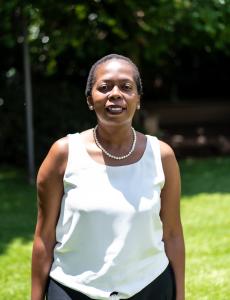Das South African Institute for Advanced Constitutional, Public, Human Rights and International Law (SAIFAC), ein Partner der Konrad Adenauer Stiftung (KAS), hat 2019 eine neue Initiative gestartet, die von der KAS unter dem Namen SAIFAC Africa Forum gefördert wird. Es handelt sich um eine Reihe von insgesamt vier Veranstaltungen, die auf den Erfahrungen Südafrikas aufbauen. Es wird versucht, sowohl rechtliche als auch nicht-juristische Experten heranzuziehen, um eine kritische Analyse ihrer Gesellschaften und ein Verständnis dafür zu entwickeln, wie sie vorangebracht werden können. Ziel ist es, ein größeres öffentliches Engagement in diesen Fragen zu fördern und kritisch darüber nachzudenken, wie man den Herausforderungen im Zusammenhang mit Demokratie, Rechtsstaatlichkeit und Konstitutionalismus in Afrika begegnen kann.
Am 19. Februar fand im Constitution Hill das erste Seminar mit dem Titel: "Does South Africa Welcome African Refugees" statt? Das Seminar wurde von über 60 Teilnehmern besucht. In seinen einleitenden Worten betonte der Direktor des SAIFAC, Prof. David Bilchitz, dass das südafrikanische Asyl- und Flüchtlingssystem unter Druck steht: In den letzten Jahren ist Südafrika zu einem der zehn wichtigsten Flüchtlingsaufnahmeländer geworden, vor allem aus dem afrikanischen Ausland. Ganz ungewöhnlich im globalen Süden führt sie die Einzelstatusbestimmung der einzelnen Geflüchteten durch, was zu einer Quote von mehr als 90% Ablehnungen führt. Das System selbst ist langsam und ineffizient. Die Zunahme fremdenfeindlicher Gewalt und anderer Formen der Intoleranz gegenüber Ausländern hat die ohnehin schon verzweifelte Notlage dieser Menschen weiter verschärft. Das Weißbuch über internationale Migration aus dem Jahr 2017 verspricht ein effizientes, sicheres und die Menschenrechte achtetendes System. Zugleich wird im Weißbuch jedoch vorgeschlagen, das Recht auf Arbeit, Geschäftstätigkeit und Studium für Asylbewerber zu beseitigen.
Das Panelbestand aus vier hochkarätigen Experten: Fatima Khan (Refugee Rights Unit, University of Cape Town); Ruvi Ziegler (University of Reading); Faith Munyati (Lawyers for Human Rights) und Loren Landau (African Centre for Migration Studies, University of Witwatersrand).
Dr. Fatima Khan beklagte, dass es einen Unterschied zwischen der Gesetzgebung und den täglichen Erfahrungen der Migranten gebe. Was die Gesetzgebung betrifft, so sollten Flüchtlinge in Südafrika gut leben, aber die Realität sehe anders aus. Die Marginalisierung der Flüchtlinge nehme kontinuierlich zu. Es scheint eine allgemeine Vorstellung zu geben, Ausländer als Wirtschaftsmigranten zu bezeichnen, so beantragten beispielsweise in Musina 10 000 Flüchtlinge Asyl, aber alle Anträge wurden abgelehnt. Einige der Antragsteller kamen aus Somalia und der Demokratischen Republik Kongo.
Faith Munyati erwähnte, dass das Gesetz vorschreibt, dass Asylbewerber eine Asylbewerbergenehmigung einholen müssen. Mit dieser Erlaubnis können sie sich in Südafrika frei bewegen, bis über den Antrag auf ihren Flüchtlings- oder Asylstatus entschieden wird. Einige Asylbewerber erhalten die Genehmigung jedoch nicht bei der Flüchtlingsaufnahme. Dies hat negative Auswirkungen auf ihr Leben in Südafrika und den Zugang zu grundlegenden Dienstleistungen wie Gesundheit.
Loren Landau erklärte, dass die meisten Südafrikaner friedlich mit ihren ausländischen Nachbarn zusammenleben, aber das Asylsystem funktioniere nicht richtig. Asylsuchenden wird der Zugang zu Gesundheitsdiensten und ihren Kindern die Geburtsurkunde verweigert. Er erklärte weiter, dass auch arme Südafrikaner leiden, sie kämpfen selbst auch darum, über die Runden zu kommen, deshalb ist es für sie schwierig, das Wenige, was sie haben, mit den ausländischen Bewohnern zu teilen. Die zivile Sterblichkeitsrate ist in Südafrika aufgrund der hohen Kriminalitätsrate hoch und der gesetzliche Status schützt die Südafrikaner nicht vor Kriminalität. Die täglichen Kämpfe armer Ausländer und armer Südafrikaner sind die gleichen. Wir brauchen neue Ansätze und neue Partnerschaften zur Stärkung der Gemeinschaften, welche die Bürger nicht voneinander entfremdet.
Ruvi Ziegler erklärte, dass es in der Europäischen Union keine Harmonisierung und Standardisierung der Flüchtlingspolitik gebe. Einige Länder der Europäischen Union verhindern, dass Asylbewerber in die EU einreisen, als Folge davon sterben Migranten im Mittelmeer.
Die Diskussionen wurden von Cristiano D'orsi von der Universität Johannesburg moderiert. Die Delegierten beteiligten sich aktiv an Kommentaren und Fragen an die Diskussionsteilnehmer. Die Kommentare reichten von Ausländern, die positive Rückmeldungen über das Leben in Südafrika gaben, bis hin zu anderen, die sich negativ über die Behandlung in Regierungsstellen und bei den Strafverfolgungsbehörden äußerten.



